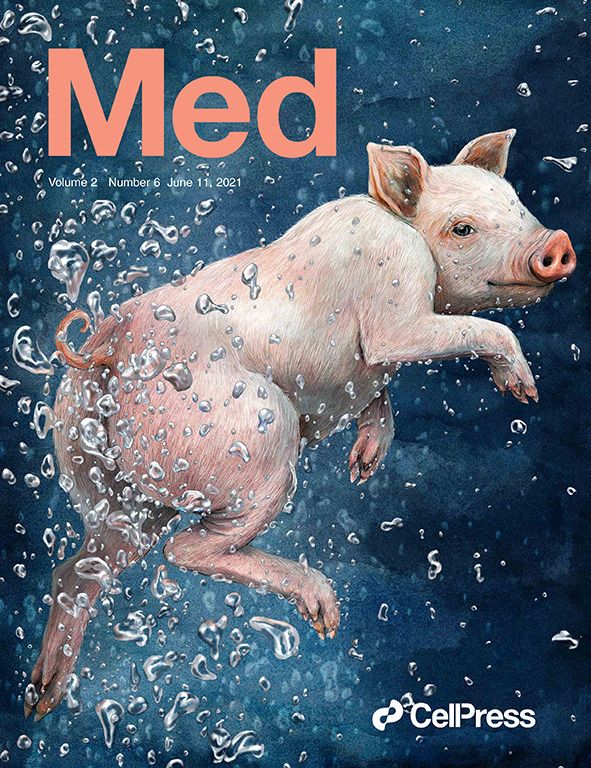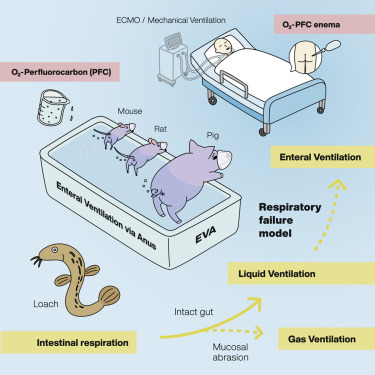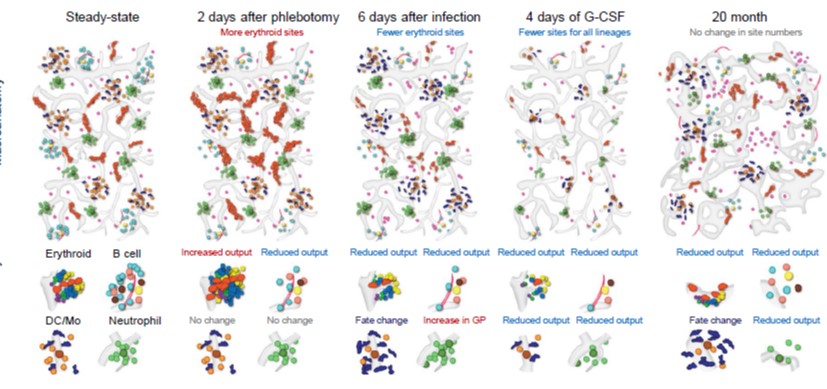New approach to managing respiratory distress? Mammals can ‘breathe’ through their intestines
Post Date: June 17, 2021 | Publish Date: May 14, 2021

“Artificial respiratory support plays a vital role in the clinical management of respiratory failure due to severe illnesses such as pneumonia or acute respiratory distress syndrome,” says Takanori Takebe, MD, PhD. “Although the side effects and safety need to be thoroughly evaluated in humans, our approach may offer a new paradigm to support critically ill patients with respiratory failure.”

A research team led by experts at Tokyo Medical and Dental University and Cincinnati Children’s reports early-stage success at helping animals survive low-oxygen conditions by providing an enema-like treatment that allowed them to “breathe” through their intestines.
Details were published May 14, 2021, in the journal Med. (Post updated with print cover image June 17, 2021)
The work was inspired by Takebe’s experience with his father suffering with lung disease, the methods some aquatic animals use to absorb oxygen, and by experiments led years ago by Cincinnati Children’s research pioneer Leland Clark, PhD, who devoted much of his career working with partial success to develop a form of artificial blood.
Takebe, the senior author for the study, holds appointments at both Cincinnati Children’s and TMDU. His previous work has included multiple breakthroughs in organoid development, including the world’s first three-organoid system (liver, pancreas and bile ducts).
In the new study, the team developed two methods to deliver oxygen to the bloodstream via rectal access to the intestines. One was a gas ventilation system, the other involved highly oxygenated liquid perfluorochemicals.
Both approaches showed promise in tests involving rodent and porcine models.

The gas ventilation system helped 75% of mice survive 50 minutes of normally lethal low-oxygen conditions, while no mice survived more than 11 minutes without assistance.
The intestinal liquid ventilation system–considered to be the most likely approach for potential use in humans–showed that rodents and pigs could walk farther in non-lethal 10% oxygen conditions, and that more oxygen reached their hearts compared to those not receiving the liquid. The intestinal liquid ventilation also reversed skin pallor and coldness without producing obvious side effects.
More research is needed to better understand the mechanisms of the oxygen transfer and to determine if the treatment works across different causes of respiratory failure, such as severe pneumonia versus acute respiratory distress.
More work also is needed to assess the safety of such treatments for humans and how much oxygenation improvement can be achieved.
The team intends to continue their work, underwritten in part by funds for COVID-19 research from the Japan Agency for Medical Research.
“The recent SARS-CoV-2 pandemic is overwhelming the clinical need for ventilators and artificial lungs, resulting in a critical shortage of available devices, and endangering patients’ lives worldwide,” Takebe says. “The level of arterial oxygenation provided by our ventilation system, if scaled for human application, is likely sufficient to treat patients with severe respiratory failure, potentially providing life-saving oxygenation.”
Read more about Takebe’s previous work at Cincinnati Children’s
World’s First Three-Organoid System Opens Doors for Medical Research and Diagnosis
Large-Scale Organoid Testing System Emerges For Predicting Risk of Liver Damage from New Medications
Explore news coverage about this discovery:
The New York Times: Trilobites: Breathing Through the Rectum Saves Oxygen-Starved Mice and Pigs
WVXU: A Liquid Injection Could Help People Who Have Trouble Breathing
New York Post: Scientists develop method allowing lab animals to ‘breathe’ from their rectum
The Japan Times: Mammals can breathe through anus in emergencies, Japanese study finds
Science NOW: Mammals can breathe through their intestines
SyFy Wire: SOME CREATURES CAN ACTUALLY BREATHE THROUGH THEIR INTESTINES — COULD WE?
C|net: Scientists say mammals can breathe through their butts in emergencies
| Original title: | Mammalian enteral ventilation ameliorates respiratory failure |
| Published in: | Med |
| Publish date: | May 14, 2021 |





